Project Lugger: Four Years On
Established by lifelong falconer Bob Dalton in May 2017, the effort to save Lugger Falcons from mass decline has seen remarkable progress in just four years. On the projects fourth anniversary, we look back on what has been achieved in recent times and ahead to a brighter future for wild Lugger Falcons.
Lugger Falcons, native to the Indian subcontinent, are a fast-declining species, little known to the western world. Across their wild range, the species is illegally trapped for use in ‘Barak’, an inhumane practice where a Lugger Falcon is used as live bait for larger falcons such as Peregrines or Sakers, which can be sold to the Arab market for a far greater sum of money. Persecution of their preferred prey item, the Spiney Tailed Lizard, for the homeopathic market; extensive use of the DDT pesticide and habitat loss are just some of the other causes behind the continued strain on their population. Whilst accurate research and data is hard to come by, it is expected that in some regions the species has declined by over 80% in 30 years.
Since its foundation, Project Lugger has taken significant strides in raising awareness for the importance of active conservation for the Lugger Falcon with both the public and within the falconry community, working with 35 partners in 7 countries across Europe. With help from the Project’s partners, developing a well-managed breeding programme with a sustainable gene pool has also been very successful in the last four years, with several new pairs sitting eggs and raising young this year.
In recent months, significant progress has been made in Pakistan. New international initiatives for research in the affected countries are promising for more specific conservation activities with appropriate backing in the coming years. Chairman Bob Dalton has also led multiple trips out to Karachi, working with the authorities and Pakistan Falconry Association to rehabilitate over 70 seized falcons, several of which were Luggers…
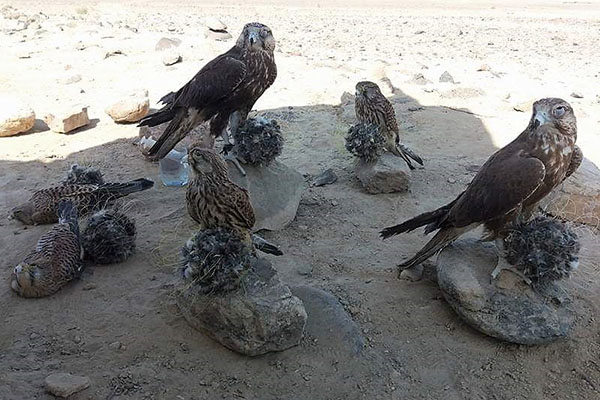
Luggers and Kestrels prepared as Barak
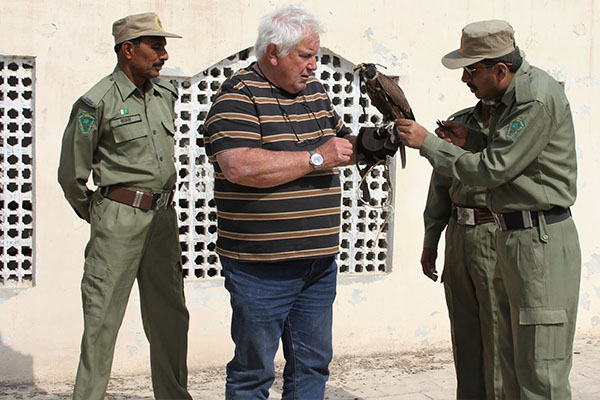
Bob at Lugger release with wildlife dept, Karachi
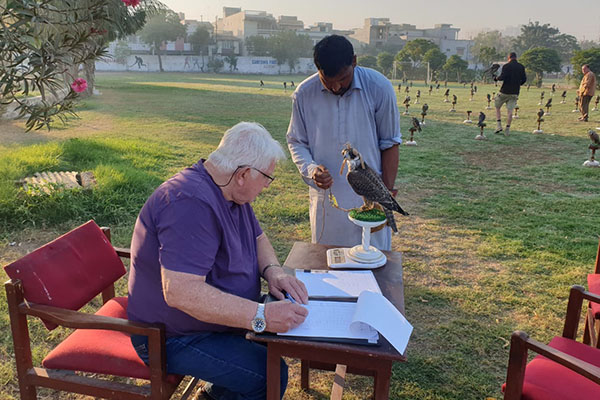
Weighing falcons in Karachi
Travelling in 2020 presented additional challenges around Coronavirus and each of the three falconers who travelled did so under their own expense and not without a great many hoops to jump through in terms of paperwork and visas, to ensure everything was done safely and legally. Over 70 falcons – Peregrines, Red Naped Shaheens and Luggers, were hooded and on blocks in the temporary 'Pakistan Customs Falcon Shelter'. On arrival one of the Lugger Falcons had already died from its injuries after being used in 'Barak' and three other falcons had died from aspergillosis, so great care had to be taken immediately to check the other falcons and ensure it did not spread further. Zoom calls from one of the most respected raptor vets in the world aided the team in Karachi, including a local vet who benefitted from first class education in raptor medicine.
Large scale rehabilitation in very different and more politically unstable countries than in western Europe, is a far greater challenge than many might imagine. The falcons in question were seized from smugglers, so all the falcons were subject to a court case, and to avoid them being immediately trapped again, the only solution would be to appropriately care for the falcons until after the trapping season and when release permits had been granted. Even sourcing safe and appropriate food for the falcons was a challenge, not to mention dealing with incoming seizures of more falcons and locals trying to buy or swap the falcons in the care of the customs department. All this resulted in more Luggers arriving for rehabilitation. The first visit was very much about establishing key routines and educating the locals in how to care for the falcons until release permits were granted, whilst the second trip in early 2021, saw the successful release of several falcons as well as the further development of strong relationships with the Pakistani authorities.

Falcons in Karachi
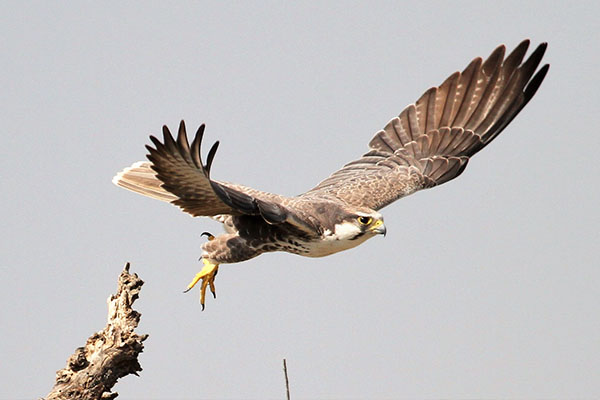
Wild Lugger, NE India
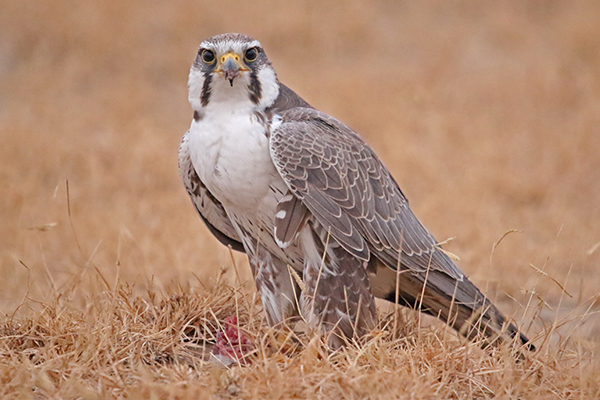
Wild adult female Lugger
Bob Dalton and another British falconer were called upon by the Karachi Customs Preventive to provide written opinions to explain why the falcons should be released, as the smugglers continued to persist with strong financial backing to have the falcons returned to their possession. Thankfully the outcome of the court case was a positive one, and release permits began to be granted. In the latter part of the trip, Bob Dalton was privileged to release several falcons including Luggers and Red Naped Shaheens, with representatives from the Wildlife Department. ‘She flew strong and hard and I watched until long after she disappeared from view, savouring the moment and what it meant’ Bobs words after releasing a young female Lugger, a lucky survivor after being trapped by smugglers.
During this time, the Government and Wildlife Departments agreed that there should be a permanent Research and Rehabilitation centre for future seizures of raptors. Multiple meetings and discussions with the relevant authorities followed, and Bob Dalton and Kamran Khan Yousfzai (president of the Pakistan Falconry Association) visited 6 potential sites for the centre. The decided location is ideal - it sits by the Himalayas in the Hunza Valley of Northern Pakistan.
Meanwhile, back in the UK, Martin Ballam (Trustee of Project Lugger and Owner of Dorset Falconry Park) and a team of staunch supporters had been working incredibly hard over the winter to build ‘The Lugger Zone’ at Dorset Falconry Park – a dedicated site for some of the Luggers in the UK captive breeding programme, and a headquarters ideal for representing the work of the Project to supporters, friends and visiting public. When the Lugger Zone was officially opened over the 8th and 9th of May this year, members, friends and supporters of Project Lugger celebrated the achievements of the past four years, whilst looking ahead to the challenges and ambitions for Lugger Falcon conservation in the future. Alongside the huge milestones reached in the UK and Europe, to be actively working in the affected countries both successfully rehabilitating wild Lugger Falcons and working with the authorities and locals for a more sustainable future, is a staggering achievement in four years. In the words of Bob, the Lugger Zone is the ‘Jewel in the crown’ for Project Lugger, and so vitally important for forging new partnerships, raising awareness and providing the perfect setting for the breeding Lugger Falcons.
Only with the generosity and ongoing support of the Projects partners, supporters and friends has the charity come so far in so little time. We urge you to learn more about Lugger Falcons and to join us in our mission to save the species.
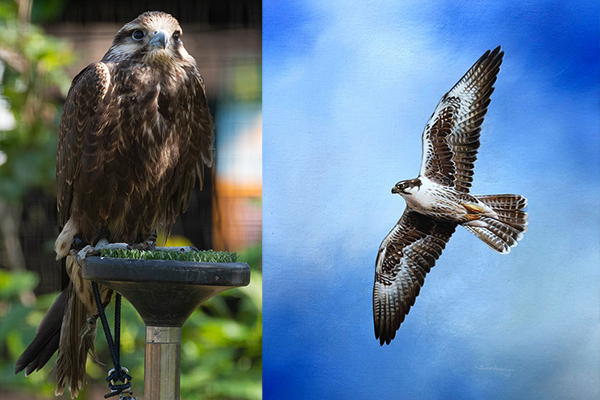
Immature male Lugger in the Project
& 'Adult Lugger in Flight' Painted by David Rampling. Commissioned by Bob Dalton.
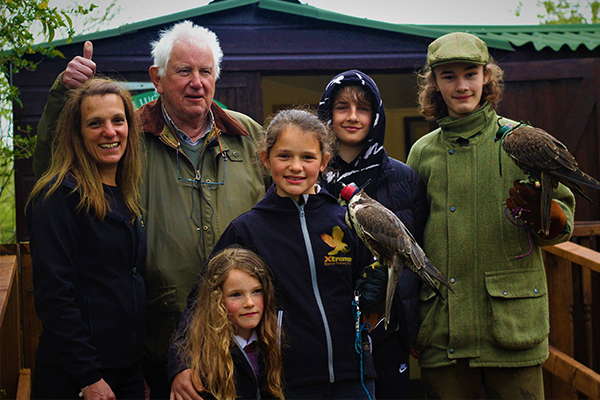
Celebrating 4 years at Dorset Falconry Park

One of the project's Luggers




